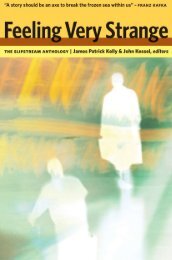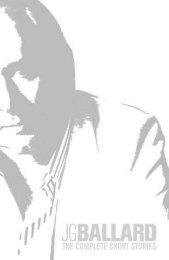The Curse of the Wer.. - Site de Thomas - Free
The Curse of the Wer.. - Site de Thomas - Free
The Curse of the Wer.. - Site de Thomas - Free
Create successful ePaper yourself
Turn your PDF publications into a flip-book with our unique Google optimized e-Paper software.
94 THE CURSE OF THE WEREWOLF<br />
Jung. Hesse was <strong>de</strong>eply interested in <strong>the</strong> work <strong>of</strong> both <strong>the</strong>orists, and<br />
un<strong>de</strong>rwent Jungian <strong>the</strong>rapy un<strong>de</strong>r a pupil <strong>of</strong> Jung’s following <strong>the</strong> First<br />
World War. He wrote Steppenwolf (1927), which is arguably his most<br />
famous novel, as a result <strong>of</strong> this experience. <strong>The</strong> Steppenwolf (wolf<br />
<strong>of</strong> <strong>the</strong> Steppes) <strong>of</strong> <strong>the</strong> title is Harry Haller, an enlightened man who<br />
never<strong>the</strong>less visualizes himself as half-man, half-wolf.<br />
<strong>The</strong>re was once a man, Harry, called <strong>the</strong> Steppenwolf. He went on two<br />
legs, wore clo<strong>the</strong>s and was a human being, but never<strong>the</strong>less he was in<br />
reality a wolf <strong>of</strong> <strong>the</strong> Steppes. He had learned a good <strong>de</strong>al <strong>of</strong> all that people<br />
<strong>of</strong> a good intelligence can, and was a fairly clever fellow. What he had<br />
not learned, however, was this: to find contentment in himself and his<br />
own life. 7<br />
Here is <strong>the</strong> i<strong>de</strong>al subject <strong>of</strong> <strong>the</strong> Enlightenment — civilized, learned,<br />
intelligent and male — and yet convinced that he is divi<strong>de</strong>d against<br />
himself. In Hesse’s hands, <strong>the</strong> werewolf mo<strong>de</strong>ls <strong>the</strong> complex psychic<br />
inheritance <strong>of</strong> <strong>the</strong> subject’s formation within mo<strong>de</strong>rnity, and Freudian<br />
psychoanalysis is imaged — in veiled terms — as a fur<strong>the</strong>r symptom <strong>of</strong><br />
this inheritance, ra<strong>the</strong>r than as a cure:<br />
It might … be possible that in [Harry’s] childhood he was a little wild<br />
and disobedient and disor<strong>de</strong>rly, and that those who brought him up had<br />
<strong>de</strong>clared a war <strong>of</strong> extinction against <strong>the</strong> beast in him; and precisely this<br />
had given him <strong>the</strong> i<strong>de</strong>a and <strong>the</strong> belief that he was in fact actually a beast<br />
with only a thin covering <strong>of</strong> <strong>the</strong> human. On this point one could speak<br />
at length and entertainingly, and in<strong>de</strong>ed write a book about it. <strong>The</strong><br />
Steppenwolf, however, would be none <strong>the</strong> better for it, since for him it<br />
was all one whe<strong>the</strong>r <strong>the</strong> wolf had been bewitched or beaten into him, or<br />
whe<strong>the</strong>r it was merely an i<strong>de</strong>a <strong>of</strong> his own. … It left <strong>the</strong> wolf insi<strong>de</strong> him<br />
just <strong>the</strong> same. 8<br />
For Hesse, <strong>the</strong> notion <strong>of</strong> <strong>the</strong> ‘beast within’ (or what he calls Harry’s<br />
‘niggardly wolf-<strong>the</strong>ory’) is negatively i<strong>de</strong>ntified with Freudian <strong>the</strong>ory.<br />
<strong>The</strong> point <strong>of</strong> Hesse’s novel was <strong>the</strong>refore to criticize <strong>the</strong> notion <strong>of</strong> <strong>the</strong><br />
‘beast within’ by <strong>de</strong>monstrating that ‘Harry does shocking violence<br />
to his poor soul when he en<strong>de</strong>avours to apprehend it by means <strong>of</strong> so<br />
primitive an image.’ 9 Hesse turned instead to Jung’s mo<strong>de</strong>l <strong>of</strong> <strong>the</strong> psyche<br />
as a cluster <strong>of</strong> subpersonalities in constantly changing and evolving





